

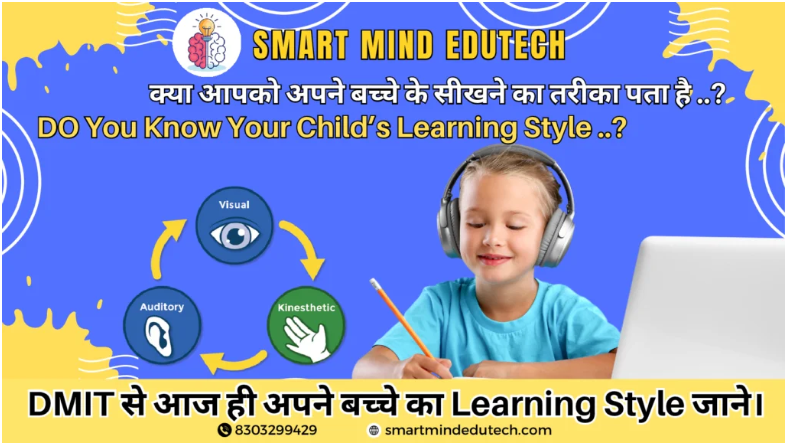
DMIT
As you know, the Indian education system, focuses more on cramming information in the minds of our children, rather than giving them true knowledge, which they can use to shape a successful career. Our system also overlooks the specific learning needs of each child, who is unique, resulting in immense stress.
- Intrinsic potential
- Dominate and Preferred Learning style
- Allocation of various abilities
- Learning Sensitivity
- Multiple Intelligence Distribution
- Learning Communication Character
- Psychological & Planning Capability
- Innate Work – Management style
8 Multiple Intelligences
The theory of Multiple Intelligences was developed in 1983 by Dr. Howard Gardner, professor of education at Harvard University. It suggests that the traditional notion of intelligence, based on I.Q. testing, is far too limited.
This theory has emerged from recent cognitive research and “documents the extent to which students possess different kinds of minds and therefore learn, remember, perform, and understand in different ways,” according to Gardner.
- Visual-Spatial Intelligence
- Verbal Linguistic Intelligence
- Intra Personal Intelligence
- Logical Mathematical Intelligenc
- Naturalistic Intelligence
- Inter Personal Intelligence
- Bodily Kinesthetic Intelligence
- Musical Rhythmic Intelligence
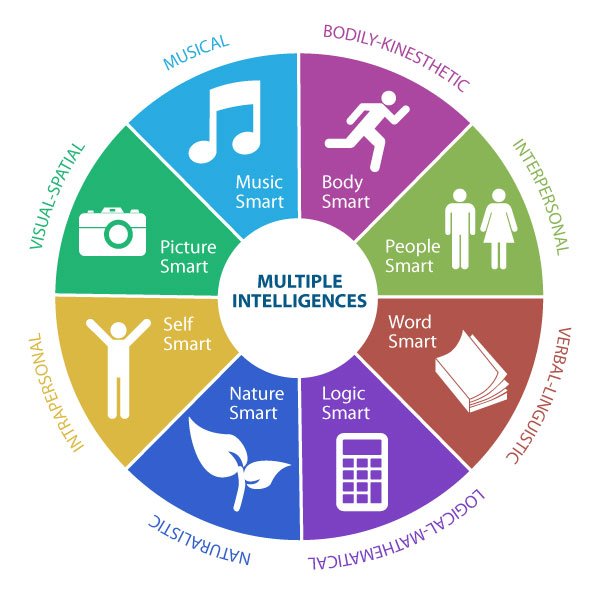
Learning Styles
Learning styles are various approaches or ways of learning. They involve educating methods, particular to an individual that are presumed to allow that individual to learn best. Most children favor some particular method of interacting with processing information.
Visual Learning Styles
Auditory Learning Styles
Kinesthetic Learning Styles
Mid Brain Activation
Midbrain is the part of brain which has got special command over both hemisphere of brain located highest side of brain stream.
By activating or stimulating mid brain we get some balance between right and left brain which enable child to live balance life with great sensory enhancement resulting to superb concentration, speedy reading and photogenic memory
- Improved Memory Power
- Enhanced Concentration Power
- More articulate thinking style and sharper mind
- Stress Management during Revision and Homework
- Objective Making & Goal Setting
- Self-Motivation Techniques (Optimism)
- Metaphorical Thinking & Power of Visualization
- Balancing the use of Conscious & Sub-Conscious Mind
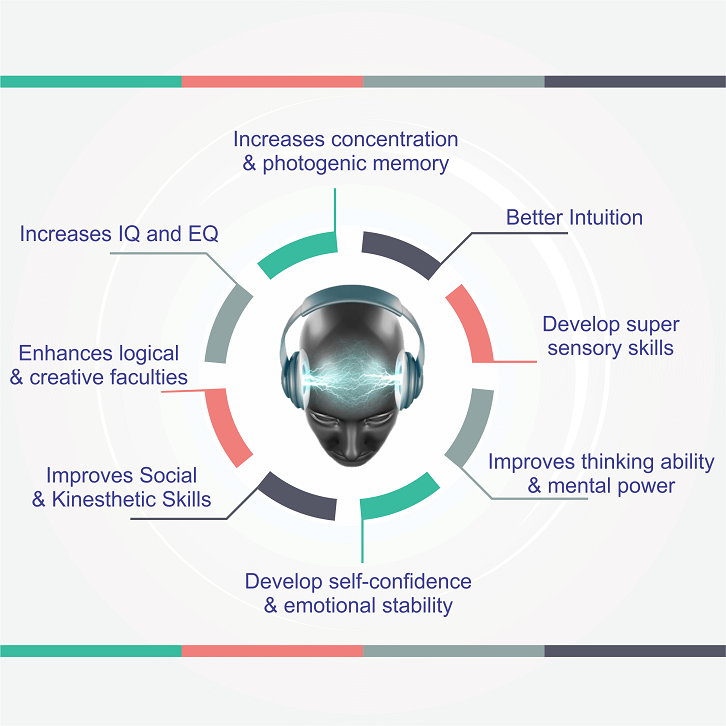
Quantum Speed Reading(Q.S.R.)
Quantum Speed Reading (Q.S.R.) is an incredible skill that harnesses a child’s innate abilities and potential. Imagine being able to rapidly flip through the pages of a book, feeling the vibrations of each page, and then converting those sensations into colors and images. With dedicated practice, it becomes possible to read entire books just by flipping through the pages.
Benefits of the Q.S.R. Course
- Increased Reading Speed
- Enhanced Problem-Solving:
- Better Memory
- Surprising Talents
- Health Improvements
- Positive Thinking
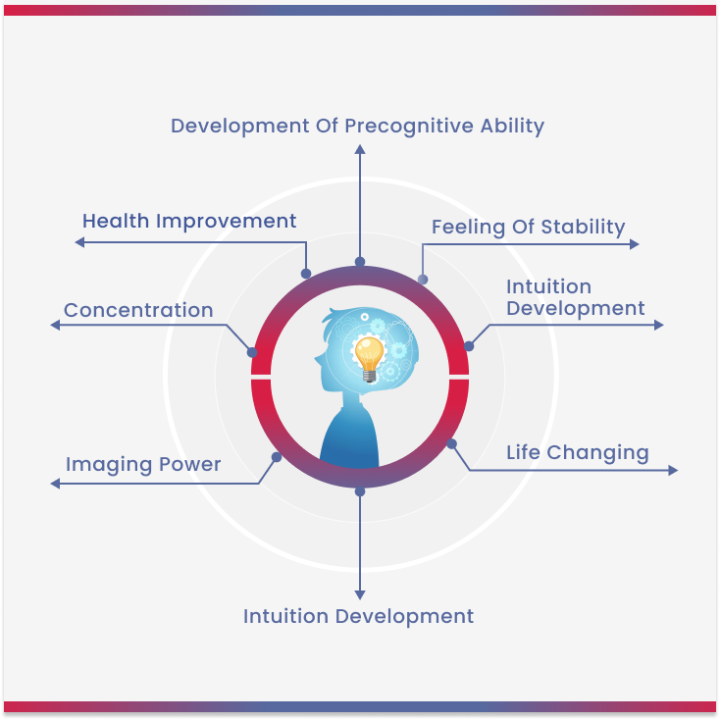
Extra Sensory Perception (E.S.P.)
E.S.P. (Extra Sensory Perception) activates our five sense organs – ears, nose, tongue, eyes, and skin. This is especially beneficial for children, enhancing their intuition, concentration, and memory. After several workshops, children reported that E.S.P. provided inner guidance during exam preparation, helping them identify important questions. This improved their study focus and exam performance.Known as the sixth sense or cryptesthesia, E.S.P. transcends ordinary sensory limits, primarily experienced through thoughts rather than physical sensations.
What is Extra Sensory Perception?
Extra Sensory Perception (E.S.P.) is the process of gaining a better understanding of the world through stimuli that activate our senses, coordinated with our brain. There are five types of stimuli: mechanical, chemical, electrical, light, and temperature.
For example, when light falls on our eyes or our tongue touches a hot beverage, these stimuli convert into neurogenic signals that travel to the brain. This is how E.S.P. works.
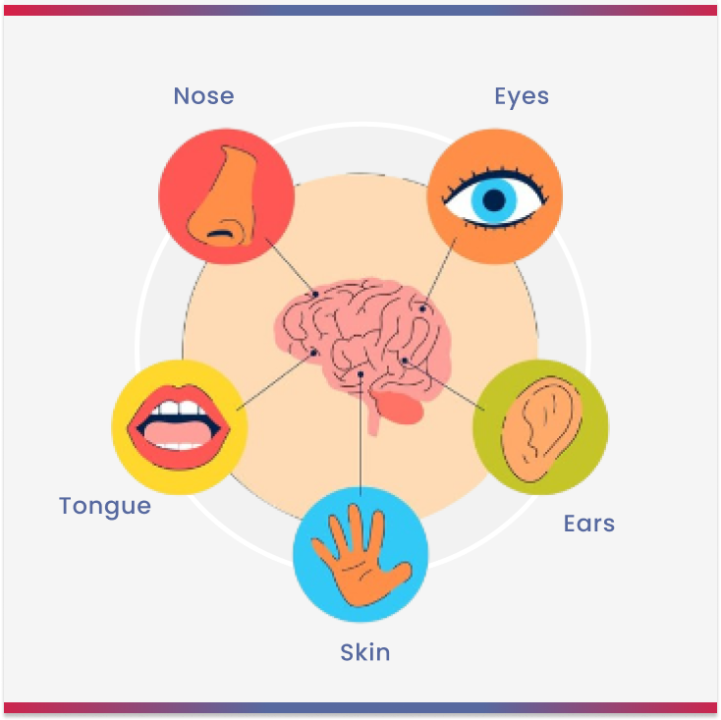
Dynamic Memory: A Course for All Ages
Dynamic Memory is packed with unique techniques, methods, and tricks that enable students to remember their study material quickly and efficiently. Here are some of the key features of the course:
Special Techniques: The course includes innovative methods that simplify the learning process, making it easier for students to grasp and retain information.
Effective Tricks: Various tricks are taught to help learners memorize content rapidly, reducing the time spent on rote learning.
Practical Methods: The course emphasizes practical, application-based learning that can be utilized across different subjects and fields of study.
Who Can Benefit? Dynamic Memory is a versatile program suitable for:
School Children, College Students, Competitive Exam Aspirants, Lifelong Learner
Advantages Over Traditional Learning
- Enhanced Learning Efficiency
- Improved Retention
- Reduced Stress
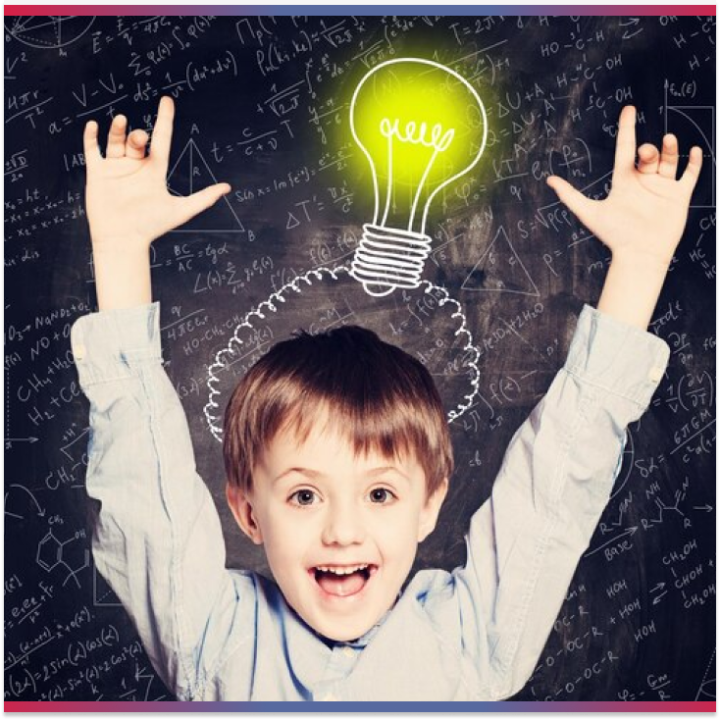
Brain Engineering
Brain engineering is a course that makes the mind truly exceptional. You might have noticed that when a student studies their course, syllabus, or other material, it consists of numerous paragraphs, topics, and chapters. As they progress, they read and memorize the content, but when asked later, it turns out they have forgotten what they studied previously, including the specific topics and details. Everything seems to slip away from their memory. However, with the brain engineering course, a student can retain the studied material to such an extent that they can remember things down to the page number. This is a fantastic course in itself. The special techniques and methods of the brain engineering course can make the brain function like a supercomputer..
The most crucial aspect of studying is retention—how quickly and how long we can recall what we’ve learned. In today’s competitive education environment, students face immense pressure, and parents invest heavily to ensure their children succeed. Despite this, many parents complain that their children forget what they’ve studied. This is often due to the reliance on rote learning, which doesn’t lead to long-term retention.
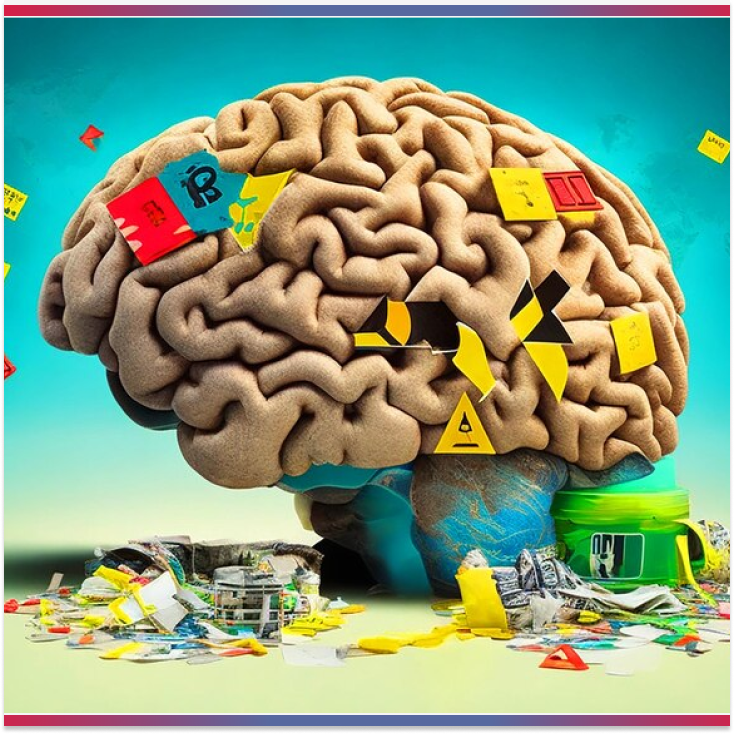
Unlocking the Power of the Abacus
The abacus, an ancient calculating tool, has been used for centuries to perform basic arithmetic operations. Consisting of beads that can be moved along rods, the abacus is not just a historical artifact but a powerful educational tool that offers numerous benefits for children today.
What is an Abacus?
An abacus is a simple, yet effective, counting frame that helps users perform mathematical calculations. It typically consists of a wooden frame with rods, each holding a series of movable beads. By sliding these beads, users can easily perform addition, subtraction, multiplication, and division.
Benefits of the Abacus for Children:
- Enhances Cognitive Skills
- Boosts Mathematical Ability
- Improves Memory and Concentration
- Develops Fine Motor Skills
- Encourages Logical Thinking
- Builds Confidence
- Provides a Strong Foundation for Advanced Mathematic
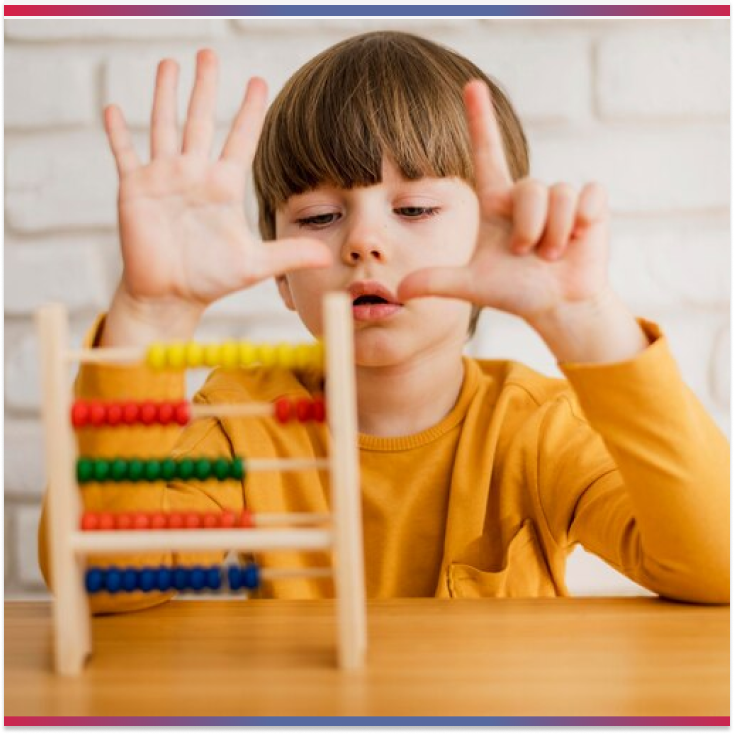
Vedic Mathematics
Vedic Mathematics is an ancient system of mathematics that originates from the Vedas, the ancient Indian scriptures. It was rediscovered in the early 20th century by Swami Bharati Krishna Tirthaji, who studied ancient texts and identified a set of mathematical principles and techniques. These techniques are intended to simplify arithmetic operations, algebra, geometry, calculus, and other mathematical calculations.
Key points about Vedic Mathematics :
- Fast Calculations (10-15 Minutes)
- Enhances Intelligence and Guessing Ability
- Improves Mental Calculation
- Increases Concentration
- Boosts Confidence
- Develops Cognitive Skills
- Decreases Math Phobia and Creates Interest
- Enhances Problem-Solving Ability
- Immediate Solutions to Difficult Problems

The Power of Phonics Learning
Phonics is a method of teaching children how to read and write by connecting sounds with letters or groups of letters. Think of written language as a code: phonics teaches kids how to crack that code. By understanding the relationship between sounds and their corresponding letters, children can decode words while reading and spell them correctly when writing.
Why Phonics Matters
- Builds Strong Reading Skills:
- Improves Spelling:
- Boosts Confidence:
- Prevents Rote Learning:
- Enhances Comprehension:
- Supports Diverse Learning Needs:
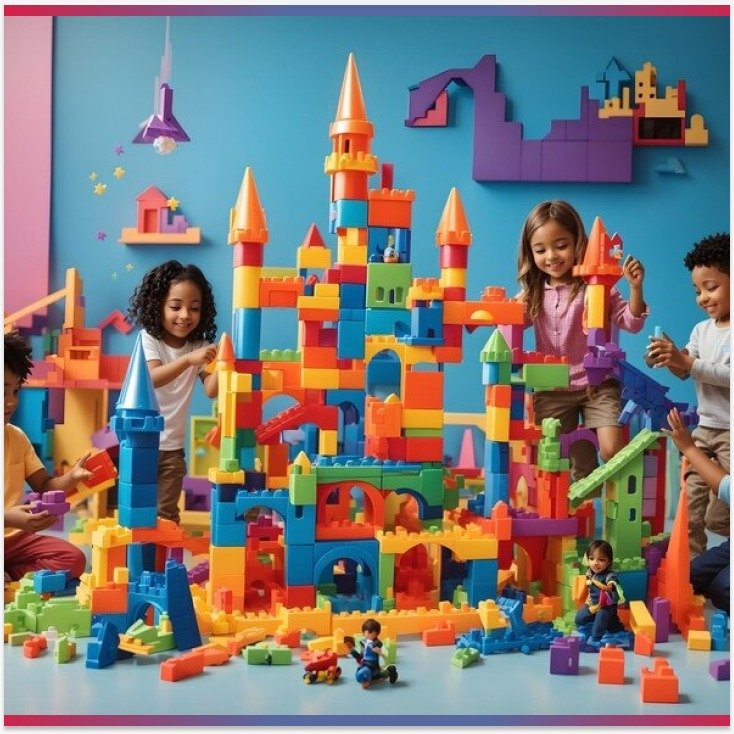
Hand Writing Improvement
Good handwriting is an important skill for kids, as it not only aids in communication but also enhances their learning and confidence. Here are some effective tips and techniques to help your child improve their handwriting.
- Start With a Positive Attitude
- Check Their Grip
- Check to See How Letters Line Up
- Make Sure All Loops Are Closed
- Look at Dotted Is and Crossed Ts
- Consider At-Home Practice

Robotics
Robotics has long captured the human imagination, from the fictional robots of science fiction to the sophisticated machines that populate today’s industrial, medical, and domestic landscapes. The evolution of robotics over the past few decades has been nothing short of remarkable, transforming industries, improving quality of life, and pushing the boundaries of what machines can achieve. In this blog post, we will delve into the history, current advancements, and future prospects of robotics.
Current Advancements in Robotics
- Industrial Robotics:
- Medical Robotics:
- Service Robotics:
- Autonomous Vehicles:
- Artificial Intelligence and Machine Learning:
The Future of Robotics
- Increased Autonomy:
- Human-Robot Collaboration:
- Advances in AI:
- Ethical Considerations:
- Biomimicry:

Pregnancy Music Therapy for the Unborn Baby
Introduction to Pregnancy Music Therapy
Pregnancy is a transformative journey, filled with profound physical and emotional changes. Amidst this incredible journey, creating a nurturing environment for your unborn baby is paramount. One beautiful and scientifically-backed way to foster this connection is through music therapy.
The Science Behind Music Therapy
Studies have shown that music can positively influence the development of an unborn baby. By the 24th week of pregnancy, a baby’s auditory system is sufficiently developed to perceive sounds from the outside world. Music therapy leverages this early auditory development to promote relaxation, reduce stress, and create a harmonious environment for both mother and baby.
Benefits of Music Therapy for Unborn Babies
- Enhanced Brain Development
- Emotional Bonding
- Stress Reduction
- Promoting Better Sleep Patterns

What Our Clients Say
Please see what our client says about Smart Mind Edutech.






